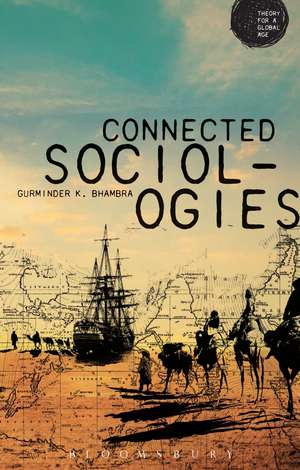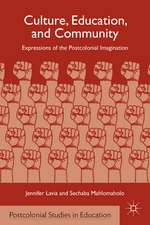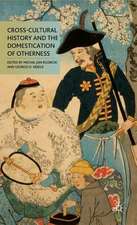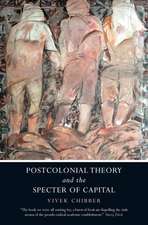Connected Sociologies: Theory for a Global Age Series
Autor Gurminder K. Bhambraen Limba Engleză Paperback – 22 oct 2014
| Toate formatele și edițiile | Preț | Express |
|---|---|---|
| Paperback (1) | 183.79 lei 6-8 săpt. | |
| Bloomsbury Publishing – 22 oct 2014 | 183.79 lei 6-8 săpt. | |
| Hardback (1) | 712.90 lei 6-8 săpt. | |
| Bloomsbury Publishing – 22 oct 2014 | 712.90 lei 6-8 săpt. |
Preț: 183.79 lei
Preț vechi: 213.87 lei
-14% Nou
Puncte Express: 276
Preț estimativ în valută:
35.17€ • 38.19$ • 29.54£
35.17€ • 38.19$ • 29.54£
Carte tipărită la comandă
Livrare economică 22 aprilie-06 mai
Preluare comenzi: 021 569.72.76
Specificații
ISBN-13: 9781780931579
ISBN-10: 1780931573
Pagini: 192
Dimensiuni: 138 x 216 x 12 mm
Greutate: 0.28 kg
Ediția:New.
Editura: Bloomsbury Publishing
Colecția Bloomsbury Academic
Seria Theory for a Global Age Series
Locul publicării:London, United Kingdom
ISBN-10: 1780931573
Pagini: 192
Dimensiuni: 138 x 216 x 12 mm
Greutate: 0.28 kg
Ediția:New.
Editura: Bloomsbury Publishing
Colecția Bloomsbury Academic
Seria Theory for a Global Age Series
Locul publicării:London, United Kingdom
Caracteristici
Adoptable across a range of upper level undergraduate and masters courses - in social theory, global sociology and postcolonial studies
Notă biografică
Gurminder K. Bhambra is Professor of Sociology and Director of the Social Theory Centre at the University of Warwick, UK. She is Series Editor of the Theory for a Global Age series.
Cuprins
Introduction: Connected Sociologies Sociological Theory and Historical Sociology 1. Modernisation Theory, Underdevelopment, and Multiple Modernities 2. From Modernisation Theory to World History Social Sciences and Questions of Epistemology 3. Opening the Social Sciences to Cosmopolitanism? 4. Global Sociology: Indigenous, Subversive, Autonomous? 5. Global Sociology: Multiple, Southern, Provincial? Connected Sociologies 6. Postcolonial and Decolonial Reconstructions 7. Sociology for an 'Always-Already' Global Age
Recenzii
Sociology has a long history of internal reexamination and critique, and some of the works in this genre-such as those of C. Wright Mills and Alvin W. Gouldner-have become classics. Bhambra follows in this tradition; in this instance, she focuses on the ways in which contemporary sociologists to date have, in her opinion, unsuccessfully grappled with the reality of globalization, both its history and its more recent intensification. The shortcomings she finds in such prominent scholars as Ulrich Beck, Michael Mann, and Immanuel Wallerstein are a result of their inability to cast off the imprint of Eurocentrism . The author concludes by proposing the creation of connected sociologies that preserve the pluralism of local experiences. Left unclear is whether the connections can or should yield a unified sociology. Summing Up: Highly recommended. Graduate students/faculty.
A vital pedagogical resource ... This is a detailed, yet expansive book, which more than fulfils its twin goals of critiquing 'backwards' the Eurocentric canon of sociology, and reconstructing 'forwards' connected sociologies produced from plural locations ... Connected Sociologies will remain a vital guiding text for those wishing to understand where we have been and where we are going to ... Bhambra's voice is an increasingly vital source of historically-informed sense which will continue to steer us through seemingly incomprehensible times.
This book presents a fresh perspective on the interface between sociology as a discipline and its other-modernity. After interrogating substantive positions (from modernization, development and multiple modernities to dependency, underdevelopment and world systems analysis) and epistemological positions (indigeneity, autonomous knowledge and decolonization) Gurminder Bhambra presents a novel argument that connected sociologies is the methodological trope that can and should exemplify global sociology. A must-read for everyone interested in the discipline and its future and in the theories of modernity.
The influential theories that still equate modernity with the West, and marginalize our colonial histories, are obsolete. Based on a deep knowledge of sociological thought, Gurminder Bhambra's important new book shows the need for radical rethinking. Connected Sociologies traces with great clarity the emerging movements of thought that give us new ways of understanding global society, and offers a hopeful future for social science.
Drawing on her previous path-breaking critique of Eurocentric modernity, Bhambra confronts us with one crucial question: can sociology account for a world that underwent globalization long before sociology took any notice and was prey to colonialism, dispossession and violence without sociology paying much attention either? The answer is "yes" if you trust and follow Bhambra's fascinating reconstruction of sociology as connected sociologies and connected histories.
A vital pedagogical resource ... This is a detailed, yet expansive book, which more than fulfils its twin goals of critiquing 'backwards' the Eurocentric canon of sociology, and reconstructing 'forwards' connected sociologies produced from plural locations ... Connected Sociologies will remain a vital guiding text for those wishing to understand where we have been and where we are going to ... Bhambra's voice is an increasingly vital source of historically-informed sense which will continue to steer us through seemingly incomprehensible times.
This book presents a fresh perspective on the interface between sociology as a discipline and its other-modernity. After interrogating substantive positions (from modernization, development and multiple modernities to dependency, underdevelopment and world systems analysis) and epistemological positions (indigeneity, autonomous knowledge and decolonization) Gurminder Bhambra presents a novel argument that connected sociologies is the methodological trope that can and should exemplify global sociology. A must-read for everyone interested in the discipline and its future and in the theories of modernity.
The influential theories that still equate modernity with the West, and marginalize our colonial histories, are obsolete. Based on a deep knowledge of sociological thought, Gurminder Bhambra's important new book shows the need for radical rethinking. Connected Sociologies traces with great clarity the emerging movements of thought that give us new ways of understanding global society, and offers a hopeful future for social science.
Drawing on her previous path-breaking critique of Eurocentric modernity, Bhambra confronts us with one crucial question: can sociology account for a world that underwent globalization long before sociology took any notice and was prey to colonialism, dispossession and violence without sociology paying much attention either? The answer is "yes" if you trust and follow Bhambra's fascinating reconstruction of sociology as connected sociologies and connected histories.
Descriere
Bhambra outlines what 'Theory for a Global Age' might look like, offering this outline as a statement for consideration, contestation and discussion. Bhambra sets the agenda for a new social theory which not only engages with global intellectual currents, but is fundamentally reshaped by them.






















